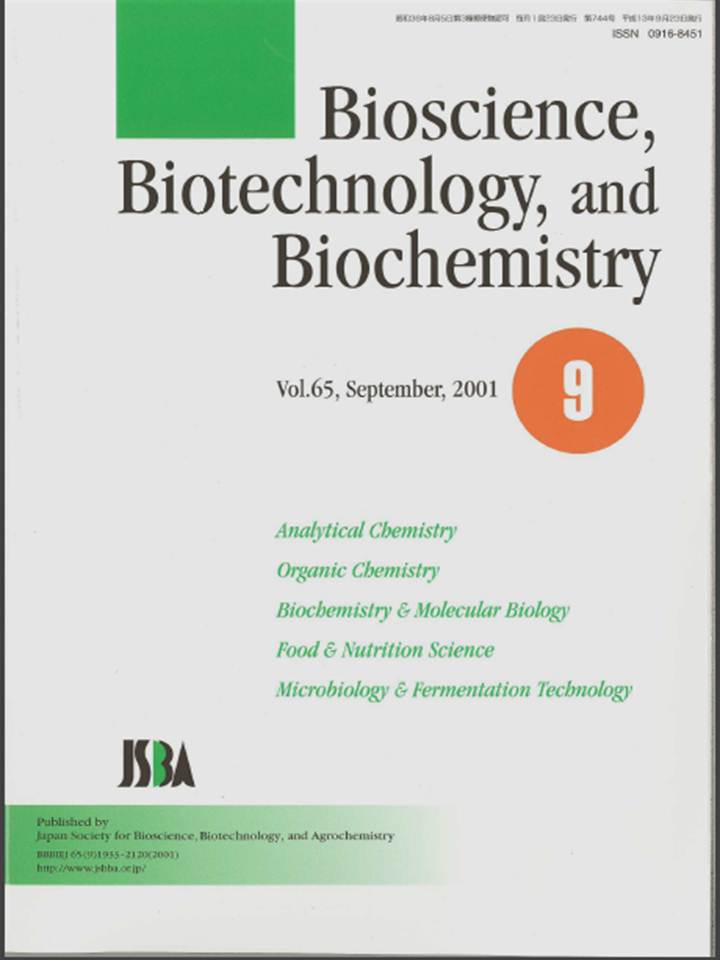Volume 65, Issue 9
Displaying 1-32 of 32 articles from this issue
- |<
- <
- 1
- >
- >|
Review
-
2001 Volume 65 Issue 9 Pages 1933-1948
Published: 2001
Released on J-STAGE: August 30, 2002
Download PDF (2314K) -
2001 Volume 65 Issue 9 Pages 1949-1956
Published: 2001
Released on J-STAGE: August 30, 2002
Download PDF (1998K)
Analytical Chemistry
-
2001 Volume 65 Issue 9 Pages 2070-2077
Published: 2001
Released on J-STAGE: August 30, 2002
Download PDF (862K)
Organic Chemistry
-
2001 Volume 65 Issue 9 Pages 1977-1980
Published: 2001
Released on J-STAGE: August 30, 2002
Download PDF (622K) -
2001 Volume 65 Issue 9 Pages 2016-2020
Published: 2001
Released on J-STAGE: August 30, 2002
Download PDF (521K) -
2001 Volume 65 Issue 9 Pages 2037-2043
Published: 2001
Released on J-STAGE: August 30, 2002
Download PDF (685K) -
2001 Volume 65 Issue 9 Pages 2044-2049
Published: 2001
Released on J-STAGE: August 30, 2002
Download PDF (558K) -
2001 Volume 65 Issue 9 Pages 2065-2069
Published: 2001
Released on J-STAGE: August 30, 2002
Download PDF (436K) -
2001 Volume 65 Issue 9 Pages 2095-2097
Published: 2001
Released on J-STAGE: August 30, 2002
Download PDF (279K) -
2001 Volume 65 Issue 9 Pages 2106-2109
Published: 2001
Released on J-STAGE: August 30, 2002
Download PDF (277K) -
2001 Volume 65 Issue 9 Pages 2110-2112
Published: 2001
Released on J-STAGE: August 30, 2002
Download PDF (236K) -
2001 Volume 65 Issue 9 Pages 2118-2120
Published: 2001
Released on J-STAGE: August 30, 2002
Download PDF (260K)
Biochemistry & Molecular Biology
-
2001 Volume 65 Issue 9 Pages 2001-2006
Published: 2001
Released on J-STAGE: August 30, 2002
Download PDF (652K) -
2001 Volume 65 Issue 9 Pages 2028-2032
Published: 2001
Released on J-STAGE: August 30, 2002
Download PDF (722K) -
2001 Volume 65 Issue 9 Pages 2050-2057
Published: 2001
Released on J-STAGE: August 30, 2002
Download PDF (979K) -
2001 Volume 65 Issue 9 Pages 2058-2064
Published: 2001
Released on J-STAGE: August 30, 2002
Download PDF (1444K) -
2001 Volume 65 Issue 9 Pages 2078-2082
Published: 2001
Released on J-STAGE: August 30, 2002
Download PDF (432K) -
2001 Volume 65 Issue 9 Pages 2090-2094
Published: 2001
Released on J-STAGE: August 30, 2002
Download PDF (970K) -
2001 Volume 65 Issue 9 Pages 2098-2101
Published: 2001
Released on J-STAGE: August 30, 2002
Download PDF (708K) -
2001 Volume 65 Issue 9 Pages 2113-2117
Published: 2001
Released on J-STAGE: August 30, 2002
Download PDF (1215K)
Food & Nutrition Science
-
2001 Volume 65 Issue 9 Pages 1970-1976
Published: 2001
Released on J-STAGE: August 30, 2002
Download PDF (726K) -
2001 Volume 65 Issue 9 Pages 1987-1992
Published: 2001
Released on J-STAGE: August 30, 2002
Download PDF (599K) -
2001 Volume 65 Issue 9 Pages 1993-2000
Published: 2001
Released on J-STAGE: August 30, 2002
Download PDF (811K) -
2001 Volume 65 Issue 9 Pages 2021-2027
Published: 2001
Released on J-STAGE: August 30, 2002
Download PDF (958K) -
2001 Volume 65 Issue 9 Pages 2033-2036
Published: 2001
Released on J-STAGE: August 30, 2002
Download PDF (397K) -
2001 Volume 65 Issue 9 Pages 2083-2086
Published: 2001
Released on J-STAGE: August 30, 2002
Download PDF (534K) -
2001 Volume 65 Issue 9 Pages 2087-2089
Published: 2001
Released on J-STAGE: August 30, 2002
Download PDF (314K) -
2001 Volume 65 Issue 9 Pages 2102-2105
Published: 2001
Released on J-STAGE: August 30, 2002
Download PDF (543K)
Microbiology & Fermentation Technology
-
2001 Volume 65 Issue 9 Pages 1957-1964
Published: 2001
Released on J-STAGE: August 30, 2002
Download PDF (765K) -
2001 Volume 65 Issue 9 Pages 1965-1969
Published: 2001
Released on J-STAGE: August 30, 2002
Download PDF (622K) -
2001 Volume 65 Issue 9 Pages 1981-1986
Published: 2001
Released on J-STAGE: August 30, 2002
Download PDF (665K) -
2001 Volume 65 Issue 9 Pages 2007-2015
Published: 2001
Released on J-STAGE: August 30, 2002
Download PDF (1110K)
- |<
- <
- 1
- >
- >|
